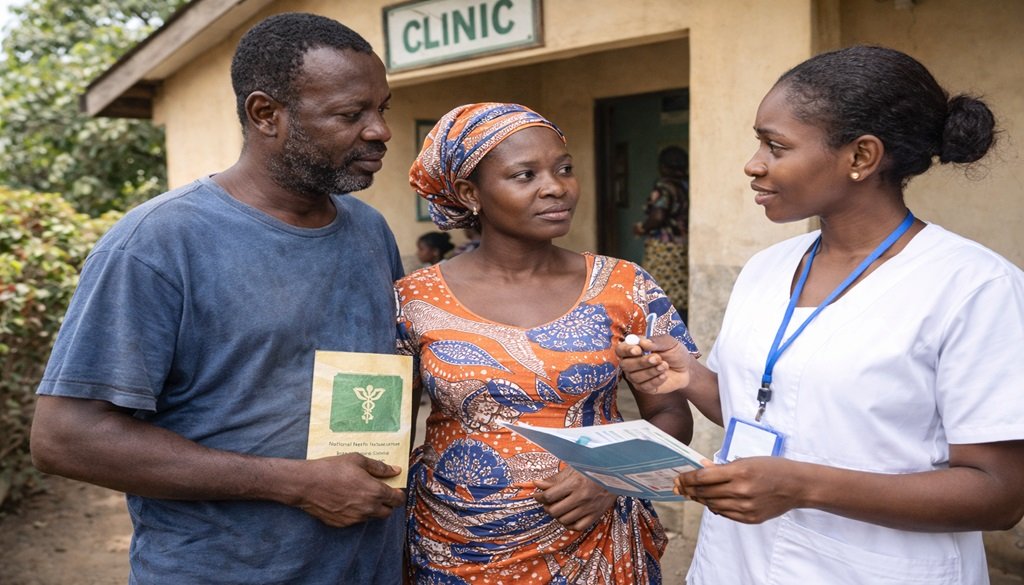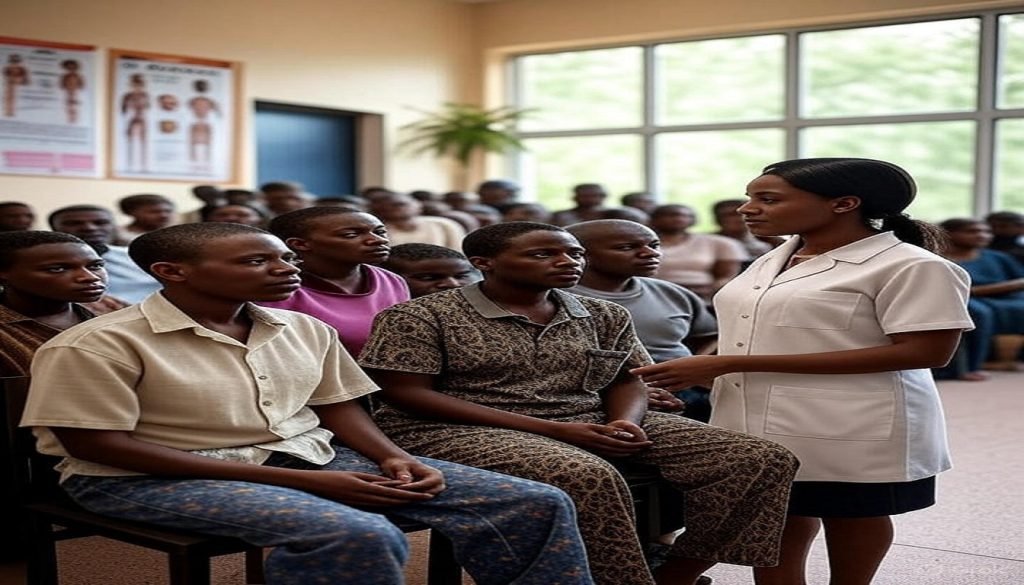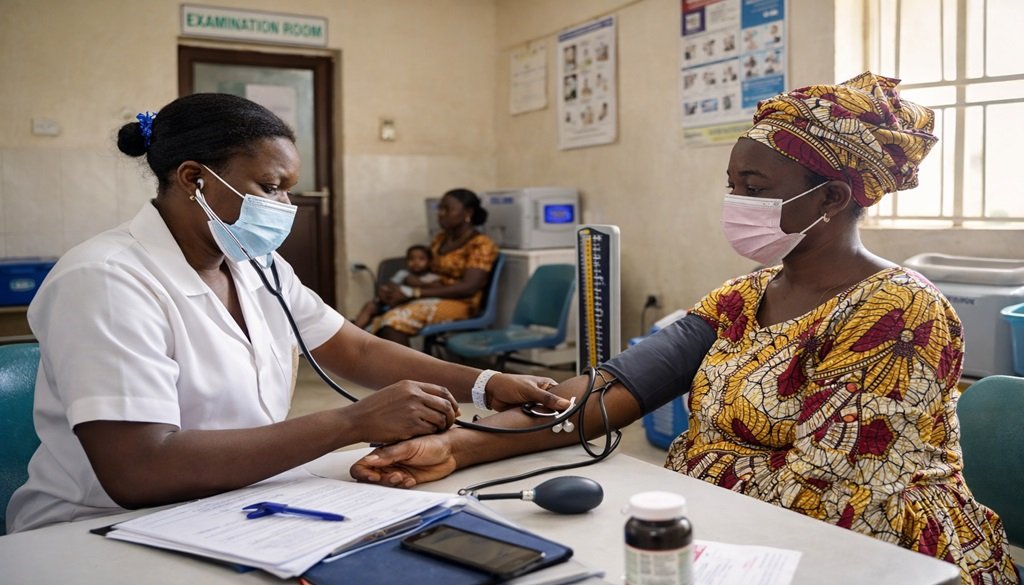Manka, a 54-year-old mason living with his three wives and 12 children in a one-room apartment in suburban Lagos, recently lost his 23-year-old wife to complications from prolonged labour. She spent two days in pain at home because he couldn’t afford a clinic visit. Sadly, her story reflects the reality of many Nigerian families—trapped between poverty and inaccessible healthcare. However, understanding how to get quality healthcare in Nigeria, even on a limited budget, can make a critical difference. With the right information and planning, families like Manka’s can access affordable medical services, reduce preventable deaths, and improve their chances of a healthier, safer future.
Nigeria’s healthcare system faces significant hurdles, including high costs, limited access in rural areas, and overstretched facilities. For many Nigerians, paying for medical care often means dipping into savings or forgoing treatment altogether. However, affordable healthcare is not just a luxury—it’s a necessity for improving quality of life, boosting productivity, and ensuring economic stability. According to the World Health Organization (WHO), only about 5% of Nigerians are covered by any form of health insurance (WHO Nigeria).
Dr. Aisha Umar, Health Economist at the University of Ibadan, states:
“Healthcare shouldn’t be a luxury. Our challenge is access, not just availability.”
This blog post explores practical ways to access quality care without draining your finances. Let’s dive into actionable solutions to navigate Nigeria’s healthcare landscape effectively. Read also: Setting SMART Health Goals
Nigeria’s Healthcare Landscape
First, let’s examine Nigeria’s healthcare system. The country spends less on health than most African nations, with per capita health expenditure at a mere $15 annually, according to a 2023 World Bank report (World Bank Health Expenditure Data). Over 70% of healthcare costs come from out-of-pocket payments, placing a heavy burden on families. Urban areas boast better facilities, while rural regions struggle with understaffed clinics and scarce resources. Dr. Chikwe Ihekweazu, former Director-General of Nigeria Centre for Disease Control, emphasizes, “Sustainable healthcare financing is critical to reducing out-of-pocket expenses for Nigerians.” Understanding these challenges sets the stage for exploring affordable options.
How to Get Quality Healthcare in Nigeria: Public vs. Private Healthcare in Nigeria

Next, consider your options: public or private healthcare. Public facilities, like general hospitals and primary health centers (PHCs), offer low-cost or free services but often face challenges. A 2024 Nigerian Medical Association study revealed that 60% of public hospitals lack adequate diagnostic equipment (NMA Report). Expect long wait times and occasional shortages of drugs or staff. Conversely, private hospitals provide faster, higher-quality care but at a steep price. For instance, a consultation in a private clinic can cost ₦10,000–₦50,000, compared to ₦1,000 or less in public facilities. Prof. Oyewale Tomori, a renowned Nigerian virologist, notes, “Private facilities offer faster services, but affordability remains a barrier for most Nigerians.” Weigh the pros (affordability in public vs. quality in private) and cons (delays in public vs. costs in private) to choose wisely. WHO Global Health Expenditure Database.
NHIA & State-Specific Health Insurance Schemes
The National Health Insurance Scheme (NHIS), now transformed into the National Health Insurance Authority (NHIA), aims to make healthcare affordable by covering basic services like consultations, maternity care, and some drugs. However, only 5% of Nigerians are enrolled, per a 2022 Health Policy Research International study (Health Policy Research). Enrollment is straightforward—visit an NHIS office or accredited hospital—but coverage is limited, with few specialists and hospitals in its network.
Many states now have localized schemes, such as LASHMA in Lagos and the Kwara State Community Health Insurance Scheme.
Private insurance plans, such as Hygeia or AXA Mansard, offer broader coverage but cost more, with premiums starting at ₦20,000 annually. Dr. Margaret Chan, former WHO Director-General, states, “Health insurance is a cornerstone of universal health coverage, but Nigeria’s NHIS needs broader reach and better implementation.” If you’re employed, check if your employer offers group insurance to reduce costs.
Practical Ways to Get Quality Healthcare in Nigeria on a Budget
Leverage Community Health Centers for Quality Healthcare in Nigeria on a Budget

Moreover, community health centers and NGOs provide vital low-cost care. PHCs, found in every local government area, offer free vaccinations, maternal care, and basic treatments. NGOs like Médecins Sans Frontières and Society for Family Health run mobile clinics and free screenings, especially in rural areas. A 2023 UNICEF report highlights that community health centers serve over 30% of rural Nigerians (UNICEF Nigeria Health). Dr. Faisal Shuaib, Executive Director of Nigeria’s National Primary Health Care Development Agency, says, “Strengthening primary health centers is key to affordable care in underserved areas.” To find a nearby PHC or NGO clinic, contact your local government health office or visit websites like Society for Family Health.
How to Get Quality Healthcare in Nigeria: Affordable Health Insurance Plans
Private HMOs like AXA Mansard, Hygeia, Avon, and Reliance HMO offer plans starting from as low as ₦3,500 per month. These plans cover consultations, tests, emergency care, and sometimes surgery.
Temie Giwa-Tubosun, Founder of LifeBank Nigeria:
“Digital HMOs are simplifying access for the informal sector.” Explore options: Health Market Nigeria
Explore Telemedicine for Quality Healthcare in Nigeria on a Budget
Additionally, telemedicine is transforming healthcare access. Platforms like Mobihealth and HealthConnect 24/7 allow virtual consultations with doctors for as low as ₦2,000 per session. This saves travel costs and time, especially for rural residents. A 2024 WHO study notes that telemedicine adoption in Africa grew by 40% post-COVID-19 (WHO Telemedicine Report). Dr. Funmi Olopade, a Nigerian-American oncologist, remarks, “Telemedicine bridges the gap for patients who cannot afford travel to urban hospitals.” To get started, download apps from platforms like Mobihealth or call their hotlines for consultations. Telemedicine is ideal for minor ailments, follow-ups, or mental health support. GSMA Mobile Health Report, Doctoora Nigeria.
Generic Drugs and Pharmacies That Support Quality Healthcare in Nigeria on a Budget
Using NAFDAC-approved generic drugs can cut medication costs by 50-70%. Pharmacy chains like Medplus, Pharmarun, and HealthPlus often stock cheaper alternatives. Unlike branded drugs, generics are equally effective but cost 60% less, according to a 2023 Pharmaceutical Society of Nigeria study (PSN Research). For example, a branded antibiotic might cost ₦5,000, while its generic version is ₦2,000. Always check for the NAFDAC approval seal to ensure safety. Pharmacies like HealthPlus and online platforms like DrugStoc stock affordable generics. Dr. Mopa Esuga, a Nigerian pharmacist, advises, “Always ask for generic alternatives to reduce prescription costs without compromising quality.” Visit trusted pharmacies or ask your doctor to prescribe generics to keep costs down. NAFDAC Drug Database: https://www.nafdac.gov.ng
Preventive Care: The Smartest Way to Maintain Quality Healthcare in Nigeria on a Budget
Equally important is preventive care. Regular checkups, vaccinations, and healthy habits like balanced diets and exercise reduce the need for costly treatments. Free services, such as polio vaccinations and malaria screenings, are available at PHCs and NGO clinics. A 2024 Lancet study shows preventive care cuts healthcare costs by 25% in low-income countries (Lancet Preventive Care). Dr. Tedros Ghebreyesus, WHO Director-General, emphasizes, “Investing in prevention is the most cost-effective way to improve health outcomes.” Schedule annual checkups and join community health programs to stay proactive about your health. Read also: Boost Immunity Naturally
Negotiate Medical Bills and Explore Payment Plans
Also, don’t hesitate to negotiate medical bills. Many private hospitals offer discounts or payment plans if you discuss upfront. A 2022 Nigerian Economic Summit Group report found that 40% of private hospitals provide flexible payment options (NESG Report). Start by asking, “Is there a discount for cash payments?” or “Can I pay in installments?” Dr. Ola Orekunrin, founder of Flying Doctors Nigeria, suggests, “Patients should inquire about payment plans to manage high treatment costs.” Always request a detailed bill to verify charges and negotiate where possible.
Kemi Akinola, MHEC Trust Nigeria:
“Don’t walk away from care due to money. Always ask for help or a plan.” Find help: DonateNG
Government Initiatives and Subsidies for Affordable Care
Besides, government programs like the Basic Health Care Provision Fund (BHCPF) make care more accessible. BHCPF subsidizes services at PHCs, covering treatments for common illnesses and maternal care. A 2023 African Development Bank report notes that BHCPF has improved access for 15% of Nigerians in pilot states (AfDB Health Report). State-specific schemes, like the Lagos State Health Scheme, also offer subsidized care. Dr. Osagie Ehanire, former Nigerian Minister of Health, states, “Government subsidies like BHCPF are critical for equitable healthcare access.” Contact your state’s health ministry to learn about local subsidies.
Summary of How to Access Quality Healthcare in Nigeria on a Budget
- Use Government Initiatives and Hospitals Offering Quality Healthcare in Nigeria on a Budget
- Leverage Community Health Centers for Quality Healthcare in Nigeria on a Budget
- Explore Telemedicine for Quality Healthcare in Nigeria on a Budget
- Affordable Health Insurance Plans: Your Key to Quality Healthcare in Nigeria on a Budget
- Find Free Clinics Providing Quality Healthcare in Nigeria on a Budget
- Generic Drugs and Pharmacies That Support Quality Healthcare in Nigeria on a Budget
- Preventive Care: The Smartest Way to Maintain Quality Healthcare in Nigeria on a Budget

For low-income earners, budgeting for healthcare feels daunting, but options exist. Prioritize essential care, like vaccinations and emergency treatments, at PHCs. Join cooperative health schemes, where members pool funds for shared medical costs. A 2024 Brookings Institution study highlights these schemes as a growing trend in Nigeria (Brookings Health Cooperatives). For inspiration, consider Aisha, a trader in Kano, who accessed free maternal care through a local PHC, saving ₦30,000. Dr. Atul Gawande, a global health expert, notes, “Community-driven health cooperatives empower low-income families to access care collectively.” Explore local cooperatives or NGOs for support.
Frequently Asked Questions
- Is the NHIS reliable in Nigeria?
NHIS covers basic services but has limited hospital networks. Supplement with private plans for broader access. - How can I find affordable specialists nearby?
Use platforms like HealthConnect 24/7 or ask PHCs for referrals to cost-effective specialists. - Are generic drugs safe to use in Nigeria?
Yes, NAFDAC-approved generics are safe and significantly cheaper than branded drugs. - What free healthcare services are available in Nigeria?
Free vaccinations, maternal care, and screenings are offered at PHCs and NGO clinics. - How can telemedicine save me money?
Telemedicine cuts travel and consultation costs, ideal for minor ailments and follow-ups. - Can I negotiate hospital bills in Nigeria?
Yes, many private hospitals offer discounts or payment plans if you negotiate upfront. - What is the Basic Health Care Provision Fund (BHCPF)?
BHCPF subsidizes care at PHCs, covering common illnesses and maternal services. - Are there mobile apps for healthcare in Nigeria?
Apps like Mobihealth and HealthConnect 24/7 provide virtual consultations and health tips. - How do I enroll in NHIS or private insurance?
Visit NHIS offices or private providers’ websites like Hygeia for details. - What NGOs provide free healthcare in Nigeria?
Organizations like Médecins Sans Frontières and Society for Family Health offer free or low-cost care.
Final Thoughts on How to Get Quality Healthcare in Nigeria on a Budget
In summary, affordable healthcare in Nigeria is achievable through smart choices. Leverage public facilities, NHIS, or private insurance for coverage. Tap into community health centers, NGOs, and telemedicine for low-cost services. Embrace generic drugs, preventive care, and negotiation to save money. Finally, explore government subsidies and cooperative schemes to ease the financial burden. Take charge of your health today—visit a PHC, download a telemedicine app, or enroll in insurance. Proactive health management ensures quality care without breaking the bank.
What’s your next step? Let us know in the comments. Ask questions, compare options, and start small. A healthier, affordable tomorrow begins with informed choices today.
Subscribe to our newsletter for more health tips, share this post with other Nigerians, join our free WhatsApp or Telegram support group, or explore local tools at HealthsClinic.com. Your health is your wealth—prioritize it today!
This post is for educational purposes only: therefore, consult your doctor before making any medical decisions.
Kindly Subscribe, Like and Share this post.





Pingback: The Burden of Sickle Cell Anemia in Nigeria